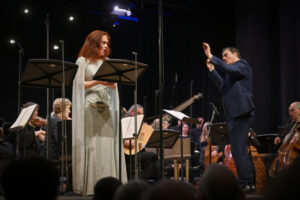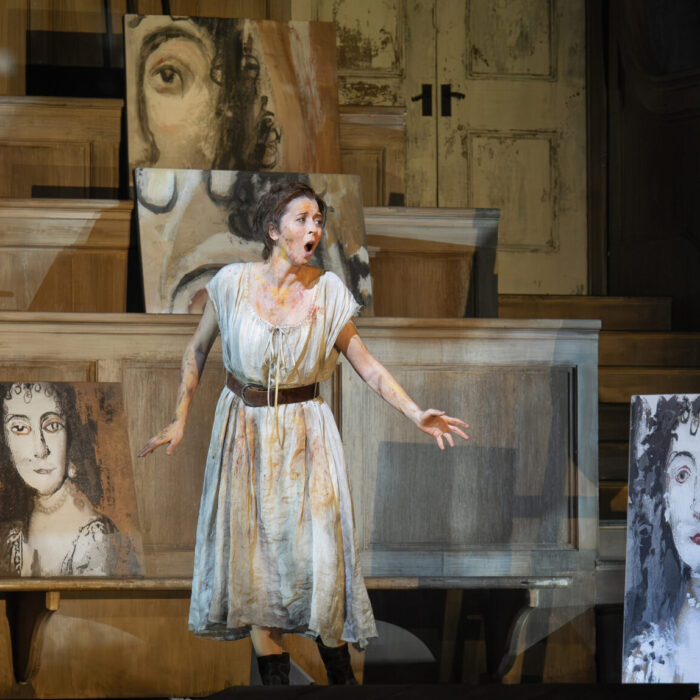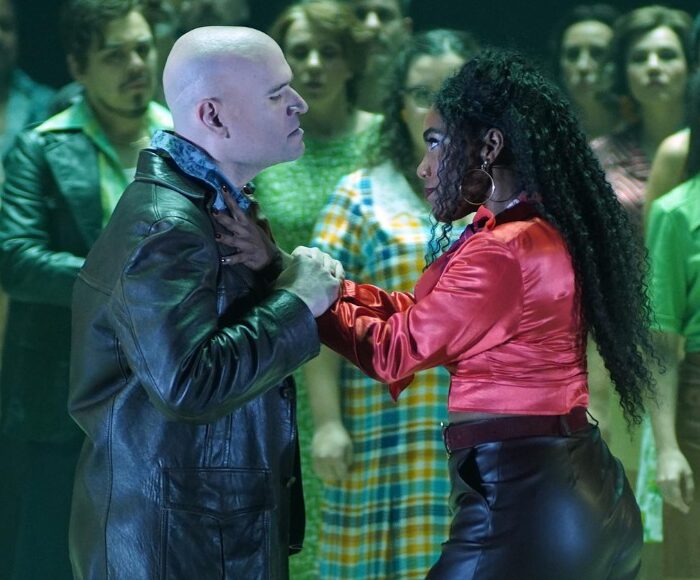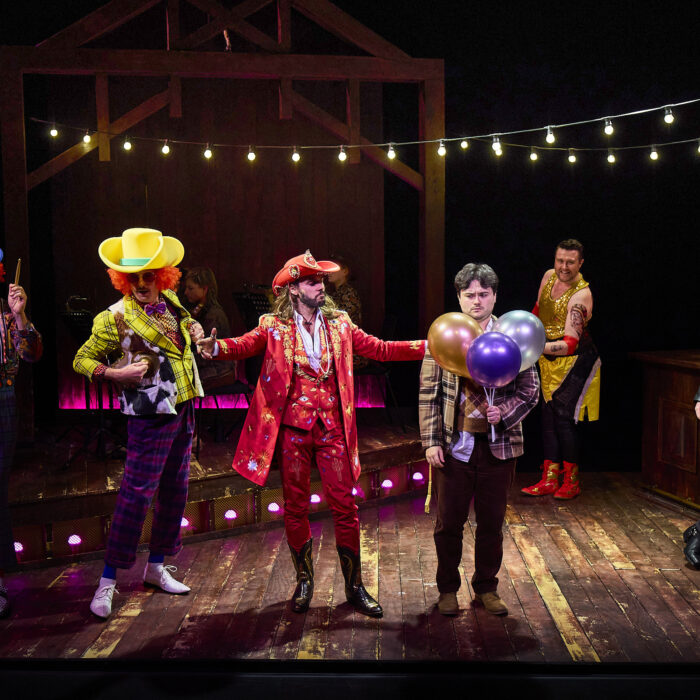
International Händel Festival Göttingen 2025 Review: Solomon
George Petrou Presents a Masterful Reading
By Alan Neilson(Photo: Alciro Theodoro Da Silva)
This year’s International Händel Festival in Göttingen got under way with a splendid concert performance of the composer’s 1748 oratorio “Solomon,” to a libretto based on accounts from the Old Testament Books of Kings, Chronicles and Song of Solomon with additional material from Josephus, although the name of the librettist is unknown.
Unlike a number of Händel’s other oratorios, however, it is not a particularly dramatic work; rather, it is contemplative, reflecting upon Solomon’s well-documented characteristics of wisdom, religious devotion and virtue, presented in three distinct acts, without a continuous plot. It is not, therefore, a work that readily lends itself to fully staged performances. The first act focuses on his piety and the founding of the temple. The second lauds Solomon’s judgement and wisdom through the retelling of the famous story of the two harlots who both claim to be the mother of the same child, while the third act exalts his virtue through his musical patronage during a visit from the Queen of Sheba.
As with most of Händel’s operas and oratorios, “Solomon” is a work that reinforces the status quo and promotes the Hanoverian monarchs as wise and virtuous rulers, devoted to God and the arts, with Solomon seen as George II. It is a work that seeks to elevate the position of God, King and Country through the power of its music; the recitatives are thus merely subordinate links to connect the commemorative choruses and uplifting arias used to affect the emotions in favor of the British state.
Musical director George Petrou produced a beautifully detailed performance, successfully moulding the combined forces of the Festspiel Orchester, Göttingen, the soloists and the double chorus to produce a balanced, integrated presentation that allowed each of the individual parts to flourish without dominating the overall sound. It was a refined and elegant, yet vibrantly active reading, which exhibited a pleasing clarity and sensitivity that he successfully used to bind the more emotionally turbulent Act two, the reflective Acts one and three, and the numerous uplifting splendors of the choral numbers that punctuate the work.
Lena Sutor-Wernich Leads a Strong Cast
Mezzo-soprano/contralto Lena Sutor-Wernich, cast in the role of Solomon, has one of the most distinctive and appealing voices that one is likely to hear on a concert stage. Her voice possesses a rich, dark, sultry tone that she is able to imbue with a brighter quality that allows her to furnish the line with a mixture of colors that she used sensitively to help define her character. In the case of Solomon this was fairly restricted, as he is presented as the archetypal wise and virtuous king; there is no emotional excess. Instead, the focus was on promoting his authoritative and thoughtful nature, his inner strength and noble bearing. Recitatives were clearly and precisely articulated and sung with purpose. Arias were beautifully rendered to capture their engaging melodies, while enabling her to show off the fascinating colors of her palette, sensitive phrasing and pleasing embellishments.
Soprano Francesca Lombardi Mazzulli also put in a fine, if very different performance, in the roles of Nicaule, Queen of Sheba, and Second Harlot. She possesses a bright, versatile voice that was able to dance lightly across the line while spinning out pleasing ornamentations and impressive coloraturas. As Nicaule, in Act one she formed a sympathetic relationship with Solomon, which was nicely captured in the duet “Welcome as the dawn of day,” in which their very different tones created a pleasing vocal tapestry. In act three, she successfully presented the Queen of Sheba’s regal bearing and sense of wonder at seeing Solomon’s court, while in Act two, she produced an expressively strong reading as the Second Harlot, in which she imbued the voice with a vicious turn. Unfortunately, however, her English pronunciation is not particularly good, which compromised her performance, especially in the delivery of the recitatives.
Soprano Carlotta Colombo made an impressive contribution as the Second Harlot, in which her pain was sensitively contrasted to Sutor-Wernich’s wise and authoritative Solomon and Lombardi Mazzulli’s aggressive Second Harlot, which was captured beautifully in the trio “Words are weak to paint my fears.” Her two arias were neatly embellished and expressively convincing, although occasionally her phrasing could have benefited from a little more delicacy, and they were delivered in a confident manner, displaying an attractive timbre.
Tenor James Way in the role of the priest, Zadok, produced a lively and versatile reading in which he praised God’s magnificence and the virtues of his servant Solomon in four beautifully crafted arias. Each was given a clearly focused, sensitively embellished and expressive interpretation that drew upon his vocal versatility, colorful palette and secure technique, which was particularly well illustrated by his aria “See the tall pine that lifts the head,” in praise of Solomon’s wisdom.
Baritone Armin Kolarczyk has a strong, confident stage presence which is reflected in his darkly colored, authoritative and well-balanced voice, which allowed him to bring a depth and significance to his role as the Levite, possibly to an extent that it did not really merit. The small passage of recitatives was clearly articulated, while his three arias were expertly crafted with delicate ornamentations, subtle accenting and dynamic contrasts, underpinned by a refined sensitivity.
Tenor Isaak Lee made the most of his role as the Attendant, delivering his passage of recitatives in an expressive, energetic and articulate manner.
The NDR Vokalensemble, consisting of 32 members in two parts, was rehearsed by Klaas-Jan de Groot. They produced a sparkling, beautifully balanced performance, with an uplifting, full sound that captured the regal magnificence of the choral numbers while also bringing out their rich harmonic textures. There was always an energy about the performance that kept the audience fully engaged, whether it was a powerful chorus such as “From the censer curling rise,” in which the chorus sang out, filling the auditorium with their joy and vitality, or quieter pieces like “May no rash intruder disturb their soft hours,” in which their delicate singing was echoed by birdsong in the orchestra.
All in all, it proved to be a strong performance that got this year’s festival off to an excellent start, one in which Petrou reaffirmed his mastery as a Händel interpreter.



